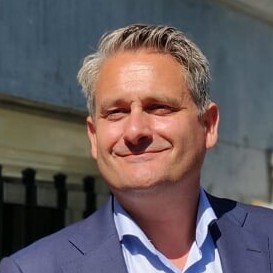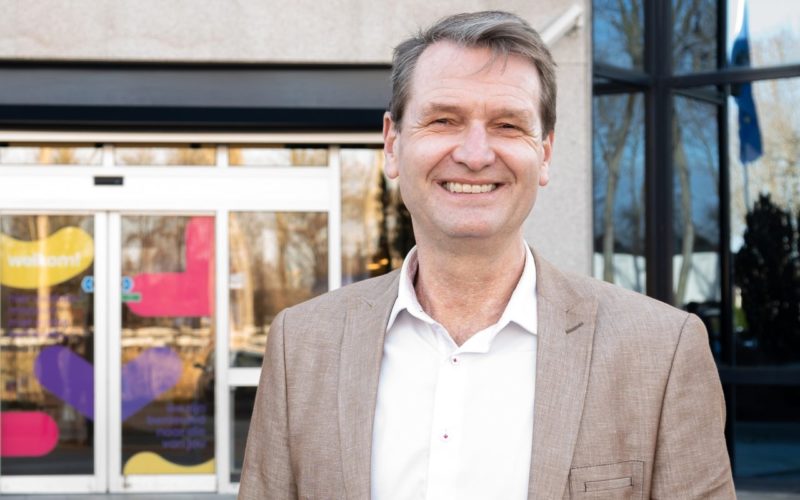
Which aspects of your job give you most energy?
The most energizing aspect, first of all, is building a team. Then once you enjoy the first results you go to the next layer of bricks building the organization. I like to share knowledge, as well as gaining it. Also, if you look at my background, I always like to be part of an organization that is breaking with the establishment. Being part of organizations that are introducing new trends, new ways of working to the market. Also, to find the right combination of finding use of new technologies and bringing new knowledge into the organization, and bottom line influence consumer or partner behavior with it.
In your career, what were the main aspects contributing to your success?
The ability to change and translate the expectations of the international organization into the local market. I’m highly adaptable in international organizations. That feels natural to me, because I have a strong background in the hospitality industry. You have to understand who is on the other side of the table. If you don’t, you will fail.
Which mistakes did you make along the way?
Oh, many. By believing that I make the difference. Whereas it’s never a person making the difference, it’s always the team. By ignoring the advice of people around me and still taking a decision, to take a certain campaign direction or take a certain strategic direction. And completely fail. I have grown into a simple philosophy in my life: more know more than one. You need to stay ahead of the market, especially as knowledge is becoming out of date. The knowledge I gained in 2005, for example, is not as useful anymore. Because the world has changed, the market changed, people have changed, consumer behavior has changed and the way we communicate and market our products has changed. If I ask one of my old colleagues “what is engagement?”, they will give me a nice story about a handshake in a restaurant. If I ask it to my 20-year-old digital marketeer, he will give me a completely different answer. And both of them are true, yet the level of relevance varies per target group.
How is your management style changed over the years?
From a directive to a more consulting way. A consulting management style with KPI’s. So, setting very clear KPI’s and then bring ourselves to the result by team effort. You can set a course, for example we need to go from Rotterdam to Amsterdam. You need to be there within 1,5 hours. So now we have a direction and a time, but it doesn’t make sense for me to tell my team which lane to drive or by what speed. You need to leave this in the hands of your team specialists.
What challenges are you currently facing with Xiaomi?
Personally, for me it’s to make sure that I stay ahead of new possibilities, new technologies. I think that marketing is all about staying ahead in the right flow and stay ahead of competition and embrace the end-user with the convincing proposition. If you look at Xiaomi in the Benelux, we have 3 focus points for now. First of all, to secure that we grow our brand awareness, to make sure the end-user is recognizes our brand. Secondly, it’s growing consideration, we should be put onto the lists of people, considering us as brand to use and product to own. Thirdly, working on loyalty and on affinity.
And personally, what are challenges for you?
Well, a personal challenge is always to find balance between work and private balance.
Is that difficult for you? Not anymore, it becomes easier. There have been years where I worked 60 or even more hours in a week. Now I work on the level that is needed. I like to work, there is nothing better than being passionate about what you do, it should be fun.
How did you find the balance? I think by listening to your surroundings, your wife, your kids and your friends will tell you when you’re out of balance. An employer is almost always happy, it can never be enough. Although I don’t truly believe that, because if you have a team of people who are in perfect life and work balance, they simply perform better. They recuperate, energize and also find the time to gain creativity, keep themselves informed and get new ideas. Sounds like an ideal world, and I know it can’t always be like this, but I do believe that this is what everyone should strive for.
Which marketing competences do you believe will be crucial to succeed in the future?
Naturally, it depends on what kind of marketeer, are you in operational level, technical or strategic level. But I think every marketeer should have to understand what is the mission, the vision and the strategy and then be able to translate it to a marketing plan and marketing execution. Whether that is on a disciplinary level, a marketing broad level or on a companywide level, once you have the capability to do this, you will win.
Bottom line, in marketing, it’s about a happy and satisfied customer who is willing to use your brand, product or service, today and tomorrow. Or, in B2B, that you have a business partner, which feels comfortable and recognizes you as a reliable and sustainable partner. So besides having analytical skills and making data-driven business decisions, you need to be able to understand what this data stands for. It’s not only about numbers. At one moment you need to add something unique to make a difference. Bringing those two worlds together, I think will be key to succeed in the future.
If you hire a new employee, what are the key elements/competences that are important to you?
It depends on the situation the organization is in, the composition of the current team and the destination you want to reach. But the goal is to always look at the current team and find which competences are still missing or needed. Which skills are there and what personality, and what’s missing. I personally don’t understand companies in which there are only men or women representing a team. Especially if your target market or audience consists of 50% men and 50% women. So to have a similar balance in a team, means you better represent the market.
In terms of competences, a marketeer should be customer/partner-oriented to really understand what your end-user or client is asking, doing or what their needs are. Additionally, an important competence I look for is decisiveness. To many times I see marketeers who say: these are all the possibilities. I’m not asking for all possibilities. At one moment, you need to decide to go left or to go right, based on the data available, and stick to it. Also, marketeers I would hire have to be goal-oriented and able to challenge what they see, get or hear. As well, to challenge yourself and strive towards the best. If you represent a brand and you don’t excel in what you do, then what would make the difference.




